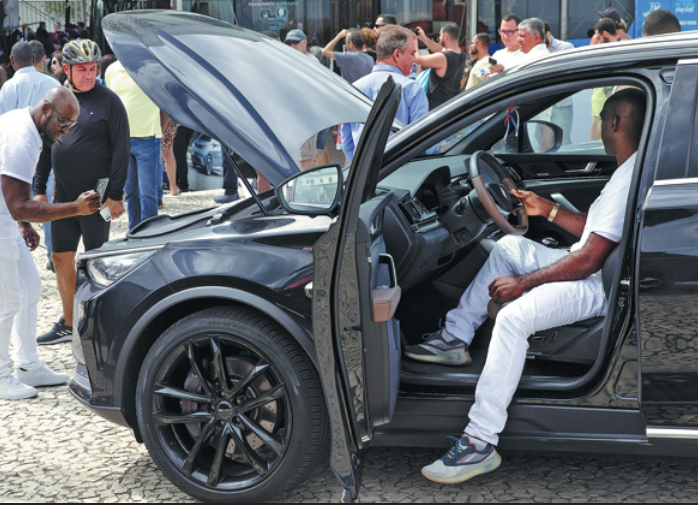source: editor:Zhang Wenni

Visitors check out a BYD electric car at an exhibition in Salvador, the capital of Brazil's Bahia state, on July 4. WANG TIANCONG/XINHUA
A 40-minute drive west of Rio de Janeiro's city center — past elevated highways — leads to the expansive Atlantic coastline of Barra da Tijuca, an upper middle-class neighborhood known for its stunning beaches.
Here, BYD opened its first dealership in Rio, marking a milestone for the city's electric vehicle market.
Marcus Vinicius, 47, is the director of BYD Itavema, located in the heart of Barra da Tijuca. Three years ago, BYD approached him to head the dealership, and that's when he decided to buy a Chinese EV for himself.
"I absolutely love it. I'm very passionate about electric vehicles," he said, adding that some of the 35 employees of the store — all Brazilians — also drive BYD vehicles.
The dynamics of Chinese companies are quite different, Vinicius said. "Chinese companies have a different culture from Brazilian companies. The reaction of BYD to the market is much faster and more dynamic compared to other brands in Brazil."
In January, BYD invited Vinicius to visit Shenzhen in South China's Guangdong province for a training program in trade marketing. "It was amazing. I loved the city and the people. The Chinese reception was very welcoming. It was a great cultural experience. The experience of visiting BYD was very memorable."
Vinicius said his son, who will turn 8 this year, has already shown a knack for cars, adding that he believes that one day, his son will also own a Chinese EV.
As of May, BYD had about 100 dealerships in Brazil, and it plans to bring that number to 250 by the end of the year, according to a news release.
At BYD Itavema on Monday morning, newlywed couples browsed cars hand in hand, young parents with their baby checked out the latest models, and business professionals relaxed on a couch as they waited for service.
The dealership, which sees about 200 visitors each week, mostly attracts affluent residents from nearby neighborhoods.
Victor Satiro first heard about BYD in April and decided to immediately buy one of its EVs. He previously owned an Audi, which is considered a hallmark of German engineering. "I used to spend a lot of money on gasoline. Now I spend nothing on fuel," he said.
Satiro said his decision was influenced by a recommendation from a friend who bought the Chinese EV in February. "My friend is a mechanical engineer, so I trust his opinion. I'm happy with this purchase," he added.
BYD now ranks 10th in sales among all automotive brands in Brazil. From January to October, the company sold 58,690 units, a 227 percent increase over the 17,937 units sold during the same period last year.
Agenor Medrado, 68, said he had been a loyal customer of South Korean automaker Kia until last week. Medrado and his wife initially planned to upgrade to a fifth-generation Kia, but they were open to exploring other brands, especially hybrids.
The Kia hybrid was priced at around 250,000 reais ($43,000), Medrado said. "Since we live nearby, we decided to come here and test-drive the BYD hybrid, which was under 200,000 reais," he added.
Medrado recalled that they decided to switch loyalties and go for the Chinese EV as soon as they got inside the car.
"We saw that it had a very modern design, fully digital and electronic, unlike traditional cars that still have a lot of mechanical gauges. The electric and combustion engines are also very quiet," he said.
Medrado, who holds a master's degree and a doctorate in mechanical engineering and has worked in the steel industry for 32 years, said he is very eager to see China bring more technology to Brazil.
"Currently, electric cars in China have advanced features, including self-driving capabilities. They can even return to the charging station automatically when the battery is low, without any manual operation," said Medrado, who has visited China at least 10 times.
He recalled that the first time he went to Beijing in 1998, he was almost hit by a bicycle. "Back then, there were millions of bicycles. … I've returned (to China) several times and witnessed the evolution of transportation, especially in Beijing. Today, cars dominate," he said.
Medrado noted China's significant transformation over the years. "In 1998, almost nobody spoke English. Today, almost everyone can speak English," he said.